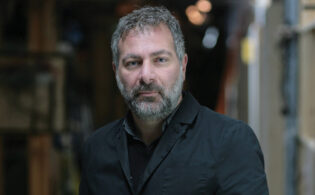Jed Mercurio, whose list of hit dramas includes Line of Duty and Bodyguard, sat down for a keynote conversation with Anna Carugati at MIPCOM today before receiving the World Screen Trendsetter Award in association with Reed MIDEM.
“He’s a tremendous screenwriter and storyteller and his recent series Bodyguard and Line of Duty are both international sensations,” said Laurine Garaude, director of the television division at Reed MIDEM, in introducing the Talent Behind the Camera keynote session. “These shows have earned him ten BAFTA Award nominations, and last year Line of Duty was named best drama series by the Royal Television Society.”
Mercurio had a strange and winding road to television writing. “I went to a very ordinary school in a small industrial town,” Mercurio said. “I didn’t get the opportunity to study drama or creative writing. I was interested in science. I was fortunate enough to get into medical school and that set me on a path of trying to find a medical specialty, and I ended up joining the Royal Air Force because I wanted to do aviation medicine and possibly even aerospace medicine. That was the career path I was on.”
Mercurio responded to an ad in the British Medical Journal placed by a television production company that was developing a new medical series. “I was struck, having started working as a doctor, how the medical dramas at that time in the U.K. seemed to be very unrepresentative of what was going on in the health service and in the medical profession. The way medicine was portrayed on TV had played a big part in me choosing to be a doctor. I had been seduced by all the myths and the glamour and then discovered it was completely different! I wanted to talk about that. Through a very strange and it will sound Machiavellian process, I ended up taking over writing the show.”
Mercurio said he had never even considered a creative career. “It was just something that wasn’t open to people from my background.”
Mercurio started as an advisor on Cardiac Arrest, offering input on how “the world could be more authentically represented. They asked me to develop some storylines, which they preferred to the ones they were getting from writers who had no direct experience of the medical world. They challenged me to write a script. I was very grateful that they spent a lot of time developing me as a writer. I certainly didn’t write the script fully formed. I made lots of very basic mistakes. At times they were reluctant to be too critical because they knew I wasn’t a TV person. I explained that I’d been to medical school. I was used to being trained through humiliation!”
Mercurio cited two areas where he brought authenticity to the medical drama. There was the technical accuracy—”on a lot of medical dramas you see procedures being carried out in an inauthentic way”—he said, and making the doctors “talk like doctors. This was a year or two before ER came out. At that time, the way in which doctors talked was pretty much jargon-free. And if they did use jargon it was little bursts of it. One of the steps I took was to make the doctors use jargon quite conversationally.”
The biggest challenge—and a controversial element—was portraying the “cynicism that starts to infiltrate your work as a doctor when human suffering becomes quite mundane to you. A lot of medical dramas show doctors being fundamentally very idealistic and invested in the patients’ well-being, not just in terms of the medical process but also their social lives. A lot of medical dramas still work on the idea that someone comes into a very busy hospital and alongside their medical problem they receive a talking cure about their social and family and emotional problems from the doctors. As anyone who has actually ever been in a hospital knows, they don’t care and they don’t have the time.”
After Cardiac Arrest, Mercurio made another medical drama, Bodies, before moving into thrillers, first with Strike Back and then Line of Duty, which focuses on a police department’s anti-corruption unit.
On crafting storylines and scenarios, Mercurio said, “It’s important to get the characters into a situation where they make plausible moral and ethical decisions. I’m trying to write about how institutions sometimes fail. If you look at all the major institutions that we encounter, like the criminal justice system or the health system, they tend to fail for the same reasons: because they are very reluctant to admit error. As a result of that defensive posture against reputational damage, that then creates the ethical dilemmas of people who are involved in those organizations who encounter error or misconduct.”
Mercurio and World Productions use multiple advisors on Line of Duty, which is distributed by Kew Media Distribution. “You have to interview the advisors and consultants and get a sense of how honest they are prepared to be. If you approach institutions, they tend to be PR-led and are very comfortable with the drama of reassurance. When we did approach a major police force, they didn’t want to assist in something which showed police officers making mistakes. You have to find someone who has a grip on reality, to be honest.”
The conversation then moved to Mercurio’s writing process. “There is an editorial team, but I’m the only writer. For each season I will pitch the story and there will be questions about it and we’ll fine-tune it. Then I will write an outline of the first episode. The editorial team on Line of Duty is within the production company and then one network executive. We have a discussion about it and based on that I will go and write the script with their notes in mind. And then we go through a drafting process. I deliver back to them, and when that script is in good enough shape, I move onto the next episode. One thing we don’t ever do is have a big story conference where we discuss the entire season arc. I keep that to myself and I don’t reveal to the rest of the team things that I’m planning to happen in future episodes.”
Heading into season six of Line of Duty, Mercurio said one of the biggest challenges is “not doing something that follows the same pattern or seems to be dealing with the same subject matter. The other thing is finding something that has critical mass, something that happens in that season opener where it captures the audience’s imagination from the events they’ve witnessed in the first 10 or 15 minutes. The actions of the antagonist portrayed in that opening are going to launch an investigation which is then carried out by our regular characters.”
The discussion then moved to Bodyguard, which Mercurio created for BBC One. “I had the idea of setting it in the political world, which hadn’t been done on British TV for a long time. Then the next stage was how to make it work as a thriller. That was really the decision to tell it from the viewpoint of a police officer. To make it kind of a cop show. In the U.K., it’s police officers who guard high-ranking politicians. Knowing that the character was a police officer and the hierarchy and jurisdictions surrounding the protagonist would be that of a cop show, it made it very easy to pitch it as something that the audience would understand. They would understand what his duty was. From that point forward it was about trying to figure out the right characters and the framework to launch the story.”
Carugati asked Mercurio about the role of the showrunner in the U.K. “The term was brought in in the U.S. to remove ambiguity because on a lot of productions there are a lot of executive producers and identifying the person who is in creative charge of the production was very useful. I would say in the U.K. we’ve made great progress in restoring some of that ambiguity! There are a lot of people who are described as showrunners who aren’t. They are lead writers. I’m now in this fortunate and privileged position where I’m wholly involved in the production. I’m part of every major creative decision. I’m on set a lot. I’m in the edit. I’m involved in talking with the directors about how things are going to be approached. And I’m there as a resource for the actors because I’m around a lot if they want to talk about a scene or their character.”


